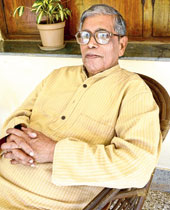 |
| Sitakant Mahapatra and (below) the cover of his book |
This book is a collection of Sitakant Mahapatra’s Odia poems written in the last five decades of his poetic career and translated into English by a group of translators that includes Jayanta Mahapatra, Bikaram Das and Bibhu Padhi. Mahapatra published his first collection of poems in 1963 and it soon established his reputation as a major voice in Odia poetry. With poems translated into almost all Indian languages and over 20 international languages, he deserves the credit for bringing attention to Odia poetry.
Mahapatra uses simple vocabulary to describe things, people and events picked up most often from the pastoral life. Distilled through a compassionate and poetic sensibility, these apparently ordinary people become symbolic representations of universal suffering. A close reading of his poetry enables the reader to discover the aptness of the myths he uses to convey something. A perceptive reader may feel the earnestness of the poet’s search for timeless values, memories he holds dear and his inevitable sadness for being disappointed in his quest. The meaning of the poem is transparently spread out; descriptions are not intended to capture readers’ fancy by their unexpectedness; they slowly unfold a reality well known, but overlooked; lines exude a silence and slowly ripple with a refreshing wind of anticipation.
A poem titled The other view: Yashoda’s soliloquy may illustrate this point. Lord Krishna’s putative mother Yashoda laments her Cassandra-like fate: the pain of knowing something profound that cannot be shared and believed by others. The matrix that holds the poem together is an incident narrated in the Bhagabata when she tries to peer into the mouth of the child Krishna to see whether he has eaten soil. Instead of soil, she finds the entire universe with all its vastness in his mouth. She shares her secret with others, but they see nothing unusual inside Krishna’s mouth when they try to verify her claim. She carries her profound and disturbing experience all alone. The poet describes her mental turmoil and her unbearable agony of knowing too much.
 |
An understanding of Indian mythic and scriptural tradition brings the textual interpreter close to Mahapatra’s poetry. However, as all lovers of poetry know, a full understanding of a poem is neither possible nor desirable for poetic enjoyment.
Some poetic techniques like skilful use of metaphors make Mahapatra a poet of distinction. He builds upon simple observations based on his experiences and meditations on life in general. His readers are not whacked into a complex or metaphysical reality; they are slowly caressed into a gradual realisation of a mystery of the world they live in.
Memories of Time showcases the chronicle of an age tormented and ecstatic almost at the same time. To chronicle such an idiosyncratic age, we need a voice of sanity; we need a poet who is simultaneously a participant in and an onlooker of the show. The poems in this collection convince us that Mahapatra is an authentic chronicler of our age.
It is not possible to give opinions on the individual translators, as their names are not mentioned against their translations. It is surprising that a compendium of translated poems should casually mention the names of translators in the publisher’s note. Thanks to the taste and efforts of the publisher, the book is impressively brought out.










